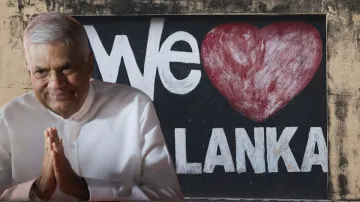Sri Lanka presidential elections: Five things to know ahead of polls on Saturday | DETAILS
Incumbent President Ranil Wickremesinghe, running as an independent, is seeking re-election in a tight contest against Sajith Premadasa and Anura Kumara Dissanayake. Sri Lankans hope their new leader will bring an improvement in their fragile economy as millions reel under poverty and debt.

Colombo: Two years after suffering its worst-ever economic crisis, Sri Lankans will vote for a new President in a tightly contested election on Saturday (September 21) that will determine the fate of the fragile economy. The cash-strapped government is currently led by President Ranil Wickremesinghe, who is seeking re-election to continue his bold reforms but faces an uphill battle with left-leaning rivals.
The economy, which collapsed in 2022 after a severe shortage of dollars, is one of the key issues for voters, who have struggled with inflation that soared to as much as 70 per cent, a battered currency and power tariffs that jumped 65 per cent. The crisis forced the ouster of former President Gotabaya Rajapaksa, and Wickremesinghe took place and assumed a leadership role in steering the economy.
While inflation has reduced to 0.5 per cent last month and Sri Lanka's GDP is predicted to grow for the first time in three years, millions of Sri Lankas are still reeling in poverty and debt, and many have pinned their hopes of a better future on their leader. Wickremesinghe had managed an uncertain recovery with the help of a $2.9 billion IMF bailout programme and a $25 billion debt restructuring process.
How many people will vote on Saturday?
About 17 million of Sri Lanka's 22 million people are eligible to vote in the first election since protests against the economic hardships in 2022 forced Rajapaksa to flee the country and later resign. Like India, Sri Lanka also has a first-past-the-post system that allows voters to cast three preferential votes for their chosen candidates, with the candidate securing 50 per cent of the votes or more declared winner.
If no candidate wins 50 per cent in the first round, there is a run-off to tally preferential votes for the two frontrunners, an outcome analysts say is likely given the close nature of the election. Votes are set to be cast in thousands of polling stations amid tight security. Campaigning for the election ended at midnight on Wednesday, 48 hours before election day.
Sri Lanka elections: Who are the candidates?
While there are a total of 38 candidates in the running for the President's post, President Wickremesinghe is facing a tight election from four other key candidates - opposition leader Sajith Premadasa, Marxist-leaning politician Anura Kumara Dissanayake, Rajapaksa family scion Namal Rajapaksa and Nuwan Bopage.
The Sri Lanka Opinion Tracker Survey by the Institute for Health Policy (IHP) shows Wickremesinghe, running as an independent, at third position. Dissanayake is the leading candidate and Premadasa of the centrist, more Left-leaning Samagi Jana Balawegaya (SJB) party is second. Despite holding just three seats in parliament, Dissanayake's promise of tough anti-corruption measures and pro-poor policies have given a popular boost to his candidacy.
Sri Lanka elections: What are the issues?
Economy and growth are at the forefront of the issues for voters as Sri Lanka goes to polls on Saturday. Whoever wins the election will have to ensure Sri Lanka gets its economy on a sustainable and inclusive growth path, reassure local and international markets, attract investors and help a quarter of the 22 million population climb out of poverty.
Sri Lanka also hopes to reduce its overall debt by $16.9 billion after coming up with a debt restructuring plan to reach 2.3 per cent of GDP primary balance target by 2025. Voters will also be looking at improvements in manufacturing and services, job creation, and reduction in taxes. A crucial factor is Sri Lanka's relations with neighbouring India and China, who are key creditors and investors in the South Asian country.
Sri Lanka elections: What are the promises?
Sri Lanka's presidential candidates wrapped up their campaigning on Wednesday, 48 hours before the election, pledging to fix the island country's ailing economy. Wickremesinghe held his first rally on August 17 in the historic city of Anuradhapura, the first of his nearly 100 rallies. His key rivals also held about a dozen rallies each.
Wickremesinghe recapped his policy wins and debt restructuring efforts in the last lap saying he hopes to complete negotiations with bondholders on Thursday. Dissanayake called for voters to back him to reduce poverty and fight corruption. Premadasa pledged to ease the cost of living for Sri Lankans and promote tourism and agriculture exports.
Sri Lanka elections: When will the results be announced?
The votes will be counted by government employees after polling ends, supervised by Election Commission officials, election monitors and representatives of candidates. The Election Commission will formally announce the winner, probably on Sunday. The winner will then take the presidential oath, usually on the same day, and appoint a new cabinet of ministers.
Whoever wins the election will have to ensure Sri Lanka gets its public finances in order, start repaying foreign creditors, attract investment and complete the four-year IMF programme.
(with agency input)
ALSO READ | Sri Lanka's Supreme Court holds President Ranil Wickremesinghe guilty of violating fundamental rights